|
|
|
Sort Order |
|
|
|
Items / Page
|
|
|
|
|
|
|
| Srl | Item |
| 1 |
ID:
139840
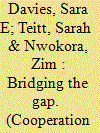

|
|
|
|
|
| Summary/Abstract |
Women, Peace and Security (WPS) scholars and practitioners have expressed reservations about the Responsibility to Protect (R2P) principle because of its popular use as a synonym for armed humanitarian intervention. On the other hand, R2P’s early failure to engage with and advance WPS efforts such as United Nations Security Council (UNSC) resolution 1325 (2000) has seen the perpetuation of limited roles ascribed to women in implementing the R2P principle. As a result, there has been a knowledge and practice gap between the R2P and WPS agendas, despite the fact that their advocates share common goals in relation to the prevention of atrocities and protection of populations. In this article we propose to examine just one of the potential avenues for aligning the WPS agenda and R2P principle in a way that is beneficial to both and strengthens the pursuit of a shared goal – prevention. We argue that the development and inclusion of gender-specific indicators – particularly economic, social and political discriminatory practices against women – has the potential to improve the capacity of early warning frameworks to forecast future mass atrocities.
|
|
|
|
|
|
|
|
|
|
|
|
|
|
|
|
| 2 |
ID:
170257
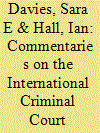

|
|
|
|
|
| Summary/Abstract |
In this Issue we are excited to share with our readers four outstanding pieces that examine the ‘for’ and ‘against’ arguments on the recent International Criminal Court decision (September 2018) to investigate and prosecute crimes against humanity committed against the Rohingya people, who fled Myanmar into Bangladesh in late August 2017.
We have published two commentaries that are in favour of the ICC decision: Victoria Colvin and Phil Orchard, University of Wollongong; Melinda Rankin, University of Queensland, and Kip Hale, Atrocity Crimes Investigations. We have also published two commentaries that adopt a (nuanced) against position on the ICC decision: Douglas Guilfoyle, UNSW Canberra at Australian Defence Force Academy (ADFA); Morten Pedersen, UNSW ADFA. These are outstanding pieces. We hope you enjoy reading them.
|
|
|
|
|
|
|
|
|
|
|
|
|
|
|
|
| 3 |
ID:
163169
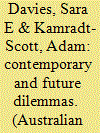

|
|
|
| 4 |
ID:
113310


|
|
|
|
|
| Publication |
2012.
|
| Summary/Abstract |
In November 2002, a man with 'atypical pneumonia' treated in Foshan hospital, Guangdong Province, in the People's Republic of China, was the first known case of Severe Acute Respiratory Syndrome (SARS). However, it was not until April 2003 that the Chinese government admitted to the full scale of 'atypical pneumonia' cases infected with SARS, two months after the disease had rapidly spread across the world with initial infections in Hong Kong and Vietnam sourced to Guangdong. In 2008, Zimbabwe experienced one of the biggest outbreaks of cholera ever recorded. By February 2009, the disease had spread across all of Zimbabwe's 10 provinces and to neighbouring countries-Botswana, South Africa, Zambia and Mozambique-causing thousands of infections amongst their populations. This article seeks to examine what duties the Chinese and Zimbabwe states had to protect their citizens and the international community from these outbreaks. The article refers to the findings of the International Law Commission's study into the role of states and international organisations in protecting persons in the event of a disaster to consider whether there is an international duty to protect persons from epidemics. The article concludes that both cases reveal a growing concept of protection that entails an international duty to assist individuals when an affected state proves unwilling or unable to assist its own population in the event of a disease outbreak.
|
|
|
|
|
|
|
|
|
|
|
|
|
|
|
|
| 5 |
ID:
163172


|
|
|
|
|
| Summary/Abstract |
In 2017, the Australian Government announced the creation of the Indo-Pacific Centre for Regional Health Security. In the same year, the Australian government investment in gender equality and empowerment in overseas development assistance reached the highest percentage ever recorded in Australian aid history. However, the health sector (excluding reproductive and family planning) has the lowest percentage of aid projects where gender equality is being mainstreamed as a primary objective. This article examines why this is the case and suggests what can be done to address the health aid sector’s gender gap. This article argues that in Australia’s largest health aid sector investment, the Indo-Pacific Centre for Health Security, there is a disconnect between the Australian government’s gender empowerment objective and its relative absence of gender inclusion policies and objectives. The solution is to prioritise gender inclusion across all health aid sector programming. Specifically, to study the lessons learned from the Australia’s gender inclusion practices in women’s health aid sector programming and to integrate them into the areas of health research and investment in emerging infectious disease outbreak response.
|
|
|
|
|
|
|
|
|
|
|
|
|
|
|
|
| 6 |
ID:
148453


|
|
|
|
|
| Summary/Abstract |
Globally gender remains a key factor in differing health outcomes for men and women. This article analyses the particular relevance of gender for debates about global health and the role for international human rights law in supporting improved health outcomes during public health emergencies. Looking specifically at the recent Ebola and Zika outbreaks, what we find particularly troubling in both cases is the paucity of engagement with human rights language and the diverse backgrounds of women in these locations of crisis, when women-specific advice was being issued. We find the lessons that should have been learnt from the Ebola experience have not been applied in the Zika outbreak and there remains a disconnect between the international public health advice being issued and the experience of pervasive structural gender inequalities among those experiencing the crises. In both cases we find that responses at the outbreak of the crisis presume that women have economic, social or regulatory options to exercise the autonomy contained in international advice. The problem in the case of both Ebola and Zika has been that leaving structural gender inequalities out of the crisis response has further compounded those inequalities. The article argues for a contextual human rights analysis that takes into account gender as a social and economic determinant of health.
|
|
|
|
|
|
|
|
|
|
|
|
|
|
|
|
| 7 |
ID:
141060


|
|
|
|
|
| Summary/Abstract |
Over the past decade, there have been increased attempts to understand the contributing factors to the relationship between healthy populations (that is, populations that have long life expectancy from birth), the prevention of conflict, and governance regimes that enable ‘healthy nations’ to survive and thrive. These studies have been largely informed by longitudinal studies on the positive relationship between regime type, provision of health care, and conflict prevention. This article examines what insights a comparison of postconflict countries in a regional setting may provide to challenge or indeed extend the findings advanced so far in the literature on the relationship between regime type and health insecurity. The Southeast Asian experience confirms the obvious – that the cessation of armed conflict is related to improved health outcomes. However, it challenges presumptions that democratisation plays a significant role in shaping this relationship.
|
|
|
|
|
|
|
|
|
|
|
|
|
|
|
|
| 8 |
ID:
117025
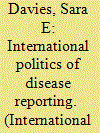

|
|
|
|
|
| Publication |
2012.
|
| Summary/Abstract |
Since the outbreak of Severe Acute Respiratory Syndrome (SARS) in 2003, there has been much discussion about whether the international community has moved into a new post-Westphalian era, where states increasingly recognize certain shared norms that guide what they ought to do in responding to infectious disease outbreaks. In this article I identify this new obligation as the 'duty to report', and examine competing accounts on the degree to which states appreciate this new obligation are considered by examining state behaviour during the H5N1 human infectious outbreaks in East Asia (since 2004). The article examines reporting behaviour for H5N1 human infectious cases in Cambodia, China, Indonesia, Thailand and Vietnam from 2004 to 2010. The findings lend strong support to the claim that East Asian states have come to accept and comply with the duty to report infectious disease outbreaks and that the assertions of sovereignty in response to global health governance frameworks have not systematically inhibited reporting compliance.
|
|
|
|
|
|
|
|
|
|
|
|
|
|
|
|
| 9 |
ID:
109874
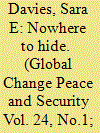

|
|
|
|
|
| Publication |
2012.
|
| Summary/Abstract |
Since the revisions to the International Health Regulations (IHR) in 2005, much attention has turned to how states, particularly developing states, will address core capacity requirements attached to the revised IHR. Primarily, how will states strengthen their capacity to identify and verify public health emergencies of international concern (PHEIC)? Another important but under-examined aspect of the revised IHR is the empowerment of the World Health Organization (WHO) to act upon non-governmental reports of disease outbreaks. The revised IHR potentially marks a new chapter in the powers of 'disease intelligence' and how the WHO may press states to verify an outbreak event. This article seeks to understand whether internet surveillance response programs (ISRPs) are effective in 'naming and shaming' states into reporting disease outbreaks.
|
|
|
|
|
|
|
|
|
|
|
|
|
|
|
|
| 10 |
ID:
164989


|
|
|
|
|
| Summary/Abstract |
The United States presidential election of Donald Trump in 2016 was observed by global health commentators as posing dire consequences for the progress made in global health outcomes, governance, and financing. This article shares these concerns, however, we present a more nuanced picture of the global health governance progress narrative pre-Trump. We argue that Trump’s presidency is a displacement activity to which global health’s pre-existing inequalities and problems of global health security, financing, and reproductive health can be attributed. Unfettered access to sexual and reproductive rights, sustained financing of health system strengthening initiatives, affordable medicines and vaccines, and a human security-centred definition of global health security were already problematic shortfalls for global health governance. Trump no doubt exacerbates these concerns, however, to blame his presidency for failings in these areas ignores the issues that have been endemic to global health governance prior to his presidency. Instead of using Trump as a displacement activity, his presidency could be an opportunity to confront dependency on US financing model, the lack of a human-security centred definition of global health security, and the norm of restricting reproductive health. It is such engagement and confrontation with these issues that could see Trump’s presidency as being a catalyst for change rather than displacement as a means of preserving the uncomfortable status quo in global health. We make this argument by focusing on three specific areas of US-led global health governance: reproductive health and the ‘global gag rule’, health financing and the President’s Emergency Plan for AIDS Relief (PEPFAR), and pandemic preparedness and global health security.
|
|
|
|
|
|
|
|
|
|
|
|
|
|
|
|
| 11 |
ID:
144243
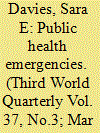

|
|
|
|
|
| Summary/Abstract |
The UN Security Council meeting on 18 September 2014 represented a major turning-point in the international response to the Ebola outbreak then underway in West Africa. However, in the light of widespread criticism over the tardiness of the international response, it can be argued that the UN, and particularly the Security Council, failed to make best use of a potential resource it already had on the ground in Liberia: the United Nations Mission in Liberia (UNMIL). This article examines whether UNMIL could have done more to contribute to the emergency response and attempts to draw some lessons from this experience for potential peacekeeper involvement in future public health emergencies. UNMIL could have done more than it did within the terms of its mandate, although it may well have been hampered by factors such as its own capacities, the views of Troop Contributing Countries and the approach taken by the Liberian government. This case can inform broader discussions over the provision of medical and other forms of humanitarian assistance by peacekeeping missions, such as the danger of politicising humanitarian aid and peacekeepers doing more harm than good. Finally, we warn that a reliance on peacekeepers to deliver health services during ‘normal’ times could foster a dangerous culture of dependency, hampering emergency responses if the need arises.
|
|
|
|
|
|
|
|
|
|
|
|
|
|
|
|
| 12 |
ID:
081497


|
|
|
|
|
| Publication |
2008.
|
| Summary/Abstract |
The 1989 Comprehensive Plan of Action (CPA) has recently been described as a successful example of how to manage large protracted refugee flows. However, this article revisits the circumstances surrounding the CPA used to resolve the prolonged Indo-Chinese refugee crisis to highlight that part of its development was linked to the fact that Southeast Asian states refused to engage with proposed solutions, which did not include repatriation for the majority of the Indo-Chinese asylum seekers who were deemed to be 'non-genuine'1 (UNGA, 1989a) refugees. This resulted in the CPA often forcibly repatriating 'non-genuine' refugees, particularly near the end of its program. This article reviews the CPA in order to assess whether its practices and results should be repeated
|
|
|
|
|
|
|
|
|
|
|
|
|
|
|
|
| 13 |
ID:
142495
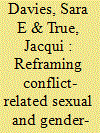

|
|
|
|
|
| Summary/Abstract |
Over the past decade, significant global attention has been paid to the issue of ‘widespread and systematic’ sexual and gender-based violence (SGBV). To contribute to the prevention of SGBV, researchers have examined the relationship between the presence of armed conflict and the causes of SGBV. Much of this causal literature has focused on the individual and group perpetrator dynamics that fuel SGBV. However, we argue that research needs to lay bare the roots of SGBV in normalized and systemic gender discrimination. This article brings back structural gender inequality as a causal explanation for SGBV. In order to better understand and prevent SGBV, we propose a critical knowledge base that identifies causal patterns of gendered violence by building on existing indicators of gender discrimination.
|
|
|
|
|
|
|
|
|
|
|
|
|
|
|
|
| 14 |
ID:
093775
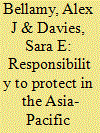

|
|
|
|
|
| Publication |
2009.
|
| Summary/Abstract |
In 2005, governments around the world unanimously agreed to the principle of the responsibility to protect (R2P), which holds that all states have a responsibility to protect their populations from genocide and mass atrocities, that the international community should assist them to fulfil this duty, and that the international community should take timely and decisive measures to protect populations from such crimes when their host state fails to do so. Progressing R2P from words to deeds requires international consensus about the principle's meaning and scope. To achieve a global consensus on this, we need to better understand the position of governments around the world, including in the Asia-Pacific region, which has long been associated with an enduring commitment to a traditional concept of sovereignty. The present article contributes to such an endeavour through its three sections. The first part charts the nature of the international consensus on R2P and examines the UN secretary-general's approach. The second looks in detail at the positions of the Asia-Pacific region's governments on the R2P principle. The final part explores the way forward for progressing the R2P principle in the Asia-Pacific region.
|
|
|
|
|
|
|
|
|
|
|
|
|
|
|
|
| 15 |
ID:
072912


|
|
|
|
|
| Publication |
2006.
|
| Summary/Abstract |
This article charts the response of Southeast Asian states to the Indochinese refugee crisis between 1975 and the 1979 Geneva conference. The purpose of this article is to understand why the outbreak of Southeast Asia's largest refugee crisis since World War II did not prompt the region's states to accede to international refugee law. It is argued that most Southeast Asian states continued to reject international refugee law during this period because they believed that their interests were best served by this policy. That is, Southeast Asian states conducted a form of 'refugee manipulation' because their persistent refusal to sign the instruments compelled Western states (the United States in particular) to provide material assistance to the refugees and offer resettlement places. Thus, the Southeast Asian states' strategy placed the onus for responding to the crisis on international institutions and Western states. Furthermore, many Southeast Asian states justified their refusal to sign the instruments by referring to the latter's Eurocentric character. Ultimately, this argument allowed many of the region's states to absolve themselves of responsibility for taking the lead in responding to the crisis.
|
|
|
|
|
|
|
|
|
|
|
|
|
|
|
|
| 16 |
ID:
081954


|
|
|
|
|
| Publication |
London, Routledge, 2008.
|
| Description |
x, 235p.
|
| Standard Number |
9780415368445
|
|
|
|
|
|
|
|
|
|
|
|
Copies: C:1/I:0,R:0,Q:0
Circulation
| Accession# | Call# | Current Location | Status | Policy | Location |
| 053585 | 363.325/BEL 053585 | Main | On Shelf | General | |
|
|
|
|
| 17 |
ID:
174634


|
|
|
|
|
| Summary/Abstract |
The COVID-19 pandemic affects all countries, but how governments respond is dictated by politics. Amid this, the World Health Organization (WHO) has tried to coordinate advice to states and offer ongoing management of the outbreak. Given the political drivers of COVID-19, we argue this is an important moment to advance International Relations knowledge as a necessary and distinctive method for inclusion in the WHO repertoire of knowledge inputs for epidemic control. Historical efforts to assert technical expertise over politics is redundant and outdated: the WHO has always been politicized by member states. We suggest WHO needs to embrace the politics and engage foreign policy and diplomatic expertise. We suggest practical examples of the entry points where International Relations methods can inform public health decision-making and technical policy coordination. We write this as a primer for those working in response to COVID-19 in WHO, multilateral organizations, donor financing departments, governments and international non-governmental organizations, to embrace political analysis rather than shy away from it. Coordinated political cooperation is vital to overcome COVID-19.
|
|
|
|
|
|
|
|
|
|
|
|
|
|
|
|
| 18 |
ID:
130969


|
|
|
|
|
| Publication |
2014.
|
| Summary/Abstract |
The Association of Southeast Asian Nations (ASEAN) Secretariat and its member states have repeatedly professed their commitment to the protection and advancement of women's economic and human rights. Such commitments have included the Declaration of the Advancement of Women in the ASEAN Region in 1988, the Declaration on the Elimination of Violence against Women in the ASEAN Region in 2004, and the ASEAN Human Rights Declaration in 2012, as well as the establishment of the ASEAN Committee on Women in 2002 and the ASEAN Commission on the Promotion and Protection of Women and Children in 2009. However, none of these regional commitments or institutions expressly take up the core concern of the Women, Peace and Security agenda set out in United Nations Security Council Resolution 1325 in 2000. ASEAN has no 1325 regional action plan and, amongst the ASEAN membership, the Philippines is the only state that has adopted a 1325 National Action Plan. The authors explore the possible reasons for the lack of ASEAN institutional engagement with 1325, outline the case for regional engagement, and suggest specific roles for the ASEAN Secretariat, donor governments and individual member states to commit to United Nations Security Council Resolution 1325 as a regional priority.
|
|
|
|
|
|
|
|
|
|
|
|
|
|
|
|
|
|
|
|
|